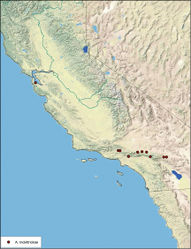Arenivaga mckittrickae
| Notice: | This page is derived from the original publication listed below, whose author(s) should always be credited. Further contributors may edit and improve the content of this page and, consequently, need to be credited as well (see page history). Any assessment of factual correctness requires a careful review of the original article as well as of subsequent contributions.
If you are uncertain whether your planned contribution is correct or not, we suggest that you use the associated discussion page instead of editing the page directly. This page should be cited as follows (rationale):
Citation formats to copy and paste
BibTeX: @article{Hopkins2014ZooKeys384, RIS/ Endnote: TY - JOUR Wikipedia/ Citizendium: <ref name="Hopkins2014ZooKeys384">{{Citation See also the citation download page at the journal. |
Ordo: Blattodea
Familia: Corydiidae
Genus: Arenivaga
Name
Arenivaga mckittrickae Hopkins, 2014 sp. n. – Wikispecies link – ZooBank link – Pensoft Profile
Type locality
USA, California, San Bernardino Co., UC Burns Reserve.
Material examined
Holotype: > in UCRC labeled “CA: San Bernardino Co, Pioneertown, 1350 m, UC Burns Reserve, 25 June 1995, J. Freilich, 37-78N 5-50E” “HOLOTYPE Arenivaga mckittrickae Hopkins, 2012” [red label with black border].
Paratypes (24): USA: CA, Los Angeles Co., Mint Canyon, 9/4/1946, P Greeley (3, LACM); CA, Los Angeles Co., Mint Canyon, 8/15/1946, 2000 ft., P Greeley, Arenivaga (1, LACM); CA, Los Angeles Co., Mint Canyon, 7/1/1946, 2000 ft., P Greeley (1, LACM); CA, Wrightwood, San Gabriel Mts., 6/26/1986, GH Nelson, Merc.Vap.Lite (3, FSCA); CA, San Bernardino Co., Mojave River Forks, 10 km SE of Hesperia, 7/11/1986, (3, UCRC); CA, San Bernardino Co., 4 mi. N of Cajon Pass, 6/12/1966, Middlekauff & Rentz (1, EMEC); CA, San Bernardino Co., Yucca Valley, Skyline Rd., UC Burns Res., 9/17/1994, W Sakai, black light (1, UCRC); CA, San Bernardino Co., San Bernardino Mts., Cushionberry Grade, 7/8/1986, GF Pratt (1, UCRC); CA, San Bernardino Co., Pioneertown, UC Burns Res., 7/9/1994, J Frellich (1, UCRC); CA, Los Angeles Co., Bouquet, 7/23/1937, N Westerland (2, LACM); CA, Los Angeles Co., Bouquet Canyon, 6/23/1937, N Westerland, at lights (1, LACM); CA, Sierra Madre, 4/10/1940 (2, LACM); CA, San Mateo (1, LACM); CA, Riverside Co., Joshua Tree NM, 9/22/1979, CD Nagano, U.Covington Flat (1, LACM); CA, San Bernardino Co., Pioneertown, UC Burns Res., 8/30/1995, 1350 m, J Frellich, 37-78N 5-50E (1,UCRC). All paratypes labeled “Paratype Arenivaga mckittrickae Hopkins 2012” [blue label with black border].
Etymology
The name is a noun in the genitive case. This species is named for F.A. McKittrick, author of the incomparable “Evolutionary Studies of Cockroaches”.
Distribution
This species is distributed from Mint Canyon, Los Angeles Co., in its northern and western extents to Joshua Tree NM, Riverside Co., in its southern and eastern extents. Its distribution follows the San Gabriel Mountain range of southern California. One specimen labeled “San Mateo” may be mislabeled or transported to that locality. See Fig. 101.
Diagnosis
Arenivaga mckittrickae is distinguished by the sinuous medial margin and narrow hook-shaped lobe on the right dorsal phallomere as well as the unusually shaped head on the genital hook. See Fig. 100.
Description
Male. Measurements. Holotype TL = 18.4 mm, GW = 7.6 mm, PW = 4.98 mm, PL = 3.58 mm, TL/GW = 2.42, PL/PW = 0.72. EW = 0.3 mm; OW = 0.45 mm. Among paratypes range of TL 16.9–19.8 mm; range of GW 7.4–9.3 mm; range of PW 5.10–5.79 mm; range of PL 3.20–4.06 mm.
Head. Two ocelli large, ovoid and protruding (0.40 ? 0.30 mm); interocular space mildly convex and dark brown with small ridges in rays around upper apex of eyes and extending onto ocellar tubercles, interocellar space concave, with faint horizontal corrugations. Posterior frons concave, uniformly light brown; anterior frons bulbous with slight central indentation at posterior end; broad, flat, light brown anteclypeus. See Fig. 99d.
Pronotum. Pronotum translucent, waxy beige; dorsal surface of pronotum with short fine brown setae centrally and posteriorly grading to longer, thicker setae laterally and anteriorly; pronotal pattern brown “panther face”; some detail discernible; brown maculations scattered across posterior 70% of dorsal surface of pronotum. See Fig. 99c.
Body. Wing brace present. Two tarsal claws present. Legs and body light orange-brown, with darker maculation laterally on each sternite; subgenital plate dark orange-brown; strongly asymmetrical with rounded apices. See Fig. 99b.
Forewings. Wings extended well beyond abdominal apex (~50% of wing length); color varies from uniform brown, to blotchy brown, to light orange-brown; surface ranges from glossy translucent to matte opaque. See Fig. 99a.
Genitalia. Right dorsal phallomere composed of bulbous sclerotized hook-shaped lobe, articulated with right ventral phallomere on lateral side; central field lightly sclerotized; increasingly punctate towards rim; rim shagreened; inner rim forms sweeping S-curve with added straight edge posteriorly; phallomere otherwise unmodified. Small central sclerite rugose, punctate, with posteriorly projecting, more sclerotized lip at anterior end; right ventral phallomere extends from articulation to form rounded shagreened structure with small interiorly directed nipple; attached anteriorly is mildly dorsally projecting flanged arm, shagreened with roughly toothed edge. Folded anterior portion of left phallomere with lightly sclerotized indentation, otherwise unmodified. Genital hook with blunt rounded head with short hook; arm robust and slightly shorter than usual in Arenivaga. See Fig. 100.
Habitat and natural history
All life history elements remain unobserved.
Original Description
- Hopkins, H; 2014: A revision of the genus Arenivaga (Rehn) (Blattodea, Corydiidae), with descriptions of new species and key to the males of the genus ZooKeys, 384: 1-256. doi
Images
|


